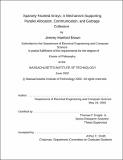Sparsely faceted arrays : a mechanism supporting parallel allocation, communication, and garbage collection
Author(s)
Brown, Jeremy Hanford, 1972-
DownloadFull printable version (647.9Kb)
Alternative title
SFAs : a mechanism supporting parallel allocation, communication, and garbage collection
Other Contributors
Massachusetts Institute of Technology. Dept. of Electrical Engineering and Computer Science.
Advisor
Thomas F. Knight, Jr.
Terms of use
Metadata
Show full item recordAbstract
Conventional parallel computer architectures do not provide support for non-uniformly distributed objects. In this thesis, I introduce sparsely faceted arrays (SFAs), a new low-level mechanism for naming regions of memory, or facets, on different processors in a distributed, shared memory parallel processing system. Sparsely faceted arrays address the disconnect between the global distributed arrays provided by conventional architectures (e.g. the Cray T3 series), and the requirements of high-level parallel programming methods that wish to use objects that are distributed over only a subset of processing elements. A sparsely faceted array names a virtual globally-distributed array, but actual facets are lazily allocated. By providing simple semantics and making efficient use of memory, SFAs enable efficient implementation of a variety of non-uniformly distributed data structures and related algorithms. I present example applications which use SFAs, and describe and evaluate simple hardware mechanisms for implementing SFAs. Keeping track of which nodes have allocated facets for a particular SFA is an important task that suggests the need for automatic memory management, including garbage collection. To address this need, I first argue that conventional tracing techniques such as mark/sweep and copying GC are inherently unscalable in parallel systems. I then present a parallel memory-management strategy, based on reference-counting, that is capable of garbage collecting sparsely faceted arrays. I also discuss opportunities for hardware support of this garbage collection strategy. I have implemented a high-level hardware/OS simulator featuring hardware support for sparsely faceted arrays and automatic garbage collection. I describe the simulator and outline a few of the numerous details associated with a "real" implementation of SFAs and SFA-aware garbage collection. Simulation results are used throughout this thesis in the evaluation of hardware support mechanisms.
Description
Thesis (Ph. D.)--Massachusetts Institute of Technology, Dept. of Electrical Engineering and Computer Science, 2002. Includes bibliographical references (p. 119-126). This electronic version was submitted by the student author. The certified thesis is available in the Institute Archives and Special Collections.
Date issued
2002Department
Massachusetts Institute of Technology. Department of Electrical Engineering and Computer SciencePublisher
Massachusetts Institute of Technology
Keywords
Electrical Engineering and Computer Science.